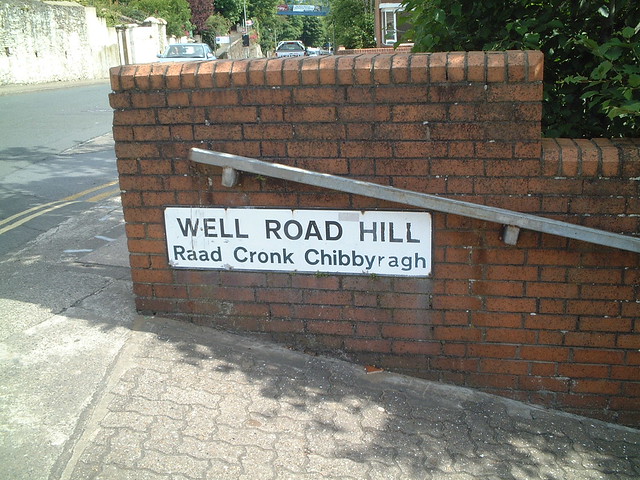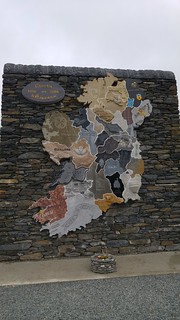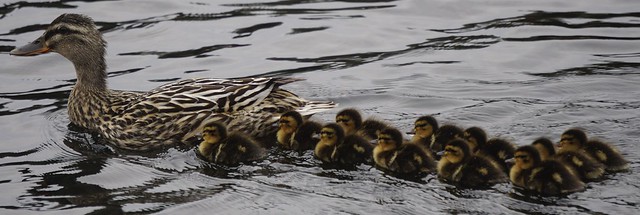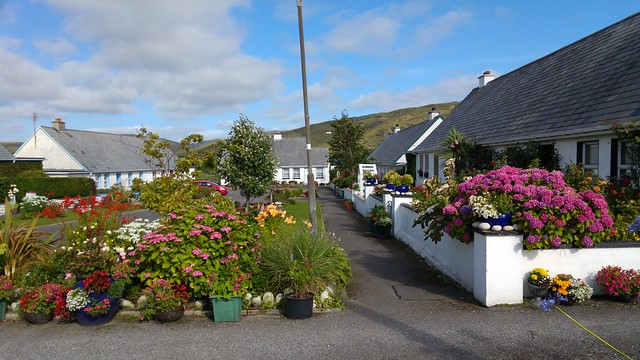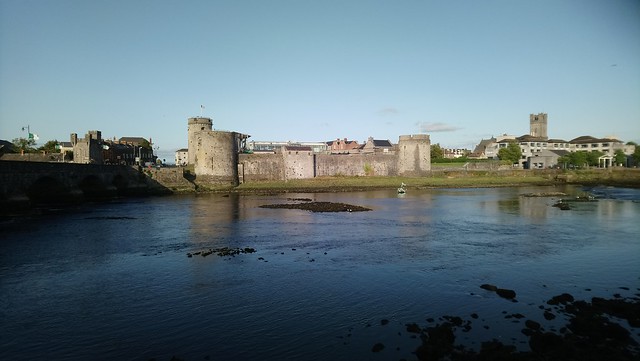Words for stream, current and related things in Celtic languages.
Words marked with a * are reconstructions.
| Proto-Celtic | *srutom = stream, river; flow, current |
|---|---|
| Gaulish | srut(u)a = torrent, stream, watercourse |
| Old Irish (Goídelc) | sruth [sruθ] = stream, river, current; strait |
| Middle Irish (Gaoidhealg) | sruth = stream, river, current, torrent, strait |
| Irish (Gaeilge) | sruth [sˠɾˠʊ(h)] = stream, current, flow sruthach = streaming, flowing, full of streams sruthaigh = to stream, flow sruthaire = stroller, vagabond, unbidden guest sruthaireacht = (act of) roaming, vagabondage, (act of) scrounging sruthán = (small) stream, rivulet, brook, gush, flow sruthánach = abounding in streams, streaming sruthlán = streamlet, rill |
| Scottish Gaelic (Gàidhlig) | sruth [sdruh] = stream, current sruthlag [sdrul̪ˠag] = runnel, streamlet sruthan [sdruhdan] = long stream of words, long-winded talk sruthach [sruhəɣ] = flowing, streaming, flow sruthan [sdruhan] = brook, streamlet sruthadair [sdruhədɪrʲ] = streamer |
| Manx (Gaelg) | stroo [struː] = current, stream, race, watercourse, tide-race, tidal flow strooan = brook, creek, river, rivulet, stream, waterway strooaney = flowing, streamed strooanagh = full of streams, streaming |
| Proto-Brythonic | *frud = stream, river; flow, current |
| Middle Welsh (Kymraec) | frut, ffrwt, ffryt = swift stream, torrent, flood, current |
| Welsh (Cymraeg) | ffrwd [fruːd] = swift stream, torrent, flood, current ffrwdel = leaves and branches piled together in a flooded river ffrwd fâl, ffrwd y felin = mill-stream ffryd(i)af, ffrydio, ffrydu = to flow, stream, gush, purl, shed ffrydiedig = flowing, shed ffrydiog = streaming, flowing ffrydiol = flowing, streaming, gushing, fluid ffrydiolrwydd = fluidity ffrydlif, ffrwdlif = stream, streaming flood, torrent, current, tide |
| Old Cornish | frot = stream |
| Middle Cornish (Cernewec) | frot = strait, channel |
| Cornish (Kernewek) | fros = current, flow fros tredan = electric current frosa = to flow |
| Old Breton (Brethonoc) | frud, frut = torrent, stream |
| Middle Breton (Brezonec) | froud = torrent, stream/td> |
| Breton (Brezhoneg) | froud [fruːt] = torrent, stream |
Etymology: from the Proto-Indo-European *srew- (to flow, stream). Words from the same PIE root include rheum, rhythm and stream in English, and Strom (large river, stream, current) in German [source].
| Proto-Celtic | *nantos / nantus = stream, valley |
|---|---|
| Proto-Brythonic | *nant [ˈnant] = stream, river, valley |
| Gaulish | *nanto = valley |
| Middle Welsh (Kymraec) | nant [ˈnant] = river, stream, brook |
| Welsh (Cymraeg) | nant [ˈnant] = river, stream, brook, rivulet; torrent, ditch, valley, glen, dale; ravine, gorge nentig, nennig = small stream |
| Old Cornish | nans = stream |
| Cornish (Kernewek) | nans [nans / nænz] = dale, valley |
| Old Breton (Brethonoc) | nant = valley |
| Middle Breton (Brezonec) | nant, ant = valley |
| Breton (Brezhoneg) | (n)ant [(n)ãnt] = valley with watercourses (archaic, used in place names) |
Etymology: possibly from Proto-Celtic *nemetom (sacred place, sanctuary), from the Proto-Indo-European *nem- (to give, take, distribute) [source].
The Francoprovençal word nant (stream) comes from the same Proto-Celtic roots [source], as does the French place name Nanterre [source], the Irish word neimheadh (sanctuary, privilege of rank, holy thing), and the Breton word neved / neñved (sanctuary) [source].
Words from the same PIE root include numb, number in English. nemen (to take, grasp, grab) in Dutch, nehmen (to take, hold, grasp) in German, nimh (poison, venom) in Irish and Scottish Gaelic [source].
| Irish (Gaeilge) | fobhar = well, stream |
|---|---|
| Middle Welsh (Kymraec) | guuer, gouer, gofer = stream gouerei, goferu, goveru = to derive, emanate, gush, stream, run, cause to flow, pour |
| Welsh (Cymraeg) | gofer = overflow of a well, stream, effluence, duct, stream, brook, rill, rivulet goferaf, goferu = to derive, emanate, gush, stream, run, cause to flow, pour goferllyd = oozy, marshy |
| Old Cornish | guuer = brook, stream |
| Middle Cornish (Cernewec) | gover = brook, stream |
| Cornish (Kernewek) | gover = brook, stream |
| Old Breton (Brethonoc) | gouher = stream |
| Middle Breton (Brezonec) | gouuer, gouer, gouvea = stream |
| Breton (Brezhoneg) | gou(v)er [ˈɡuː(v)ɛr] = stream, streamlet gouverian, gouveriañ = to irrigate |
Etymology: unknown [source].
| Proto-Celtic | *wētā, *wēttā = swamp, stream |
|---|---|
| Old Irish (Goídelc) | féith [fʲeːθʲ] = vein, sinew, kidney |
| Middle Irish (Gaoidhealg) | féith, feith = kidney, fibre, sinew, vein, artery, vessel féithech = sinewy, veined |
| Irish (Gaeilge) | féith [fʲeː(h)] = sinew, muscle, vein, soft seam in bogland, vine féitheach = sinewy, muscular, veined, ribbed, swampy féitheog = (small) sinew, muscle, vein féitheogach = sinewy, muscular, brawny |
| Scottish Gaelic (Gàidhlig) | fèith [feh] = muscle, sinew, vein, stagnant channel in a bog (often overgrown with moss and dry in summer) fèith-dhìreach = gullet, oesophagus fèith-lùthaidh = sinew, tendon fèitheach [fɛː.əx] = muscled, muscly, sinewy, veiny fèitheag [fɛː.ag] = small muscle, sinew or vein |
| Manx (Gaelg) | feh = nerve, sinew, tendon fehagh = sinewy |
| Middle Welsh (Kymraec) | guyth, gwyth, gỽyth = vein, sinew, nerve, stream gúithén, gwythen = vein, blood-vessel, artery, muscle gwythiennawc, gwythennoc = veined, full of veins, venous, striated |
| Welsh (Cymraeg) | gŵyth [ɡuːɨ̯θ/ɡʊi̯θ] = vein, sinew, nerve, stream, brook, ditch, gutter, drain, channel, firth, estuary gwythennus = full of veins, veined, veiny gwythïen, gwythen = vein, blood-vessel, artery, muscle, siney, (harp) string gwyth(i)ennog = veined, full of veins, venous, striated |
| Old Cornish | guid = channel, pipeline, vein |
| Middle Cornish (Cernewec) | gwyth, goth = channel, pipeline, vein |
| Cornish (Kernewek) | gooth = channel, pipeline, vein |
| Old Breton (Brethonoc) | goed, guoeth = stream |
| Middle Breton (Brezonec) | goazz, goaz, gouaz = stream |
| Breton (Brezhoneg) | gwazh [ɡwaːs] = stream, canal, channel, washhouse, marshy meadow gwazheg = watered, marshy gwazhell = watered land gwazhenn = vein gwazhian, gwazhiañ = to dig a stream, to make a bed, to water gwazhiennek = veined |
Etymology: possibly from the Proto-Indo-European *weyh₁- (to whither), which is also the root of výsti (whither) in Lithuanian, and vissna (to wilt, whither) in Swedish [source].
Sources: Wiktionary, Am Faclair Beag, Online Manx Dictionary, Teanglann.ie, eDIL – Electronic Dictionary of the Irish Language, In Dúil Bélrai English – Old Irish glossary, Geiriadur Prifysgol Cymru, Gerlyver Kernewek, Dictionaire Favereau, TermOfis, English – ProtoCeltic WordList (PDF), Etymological Dictionary Of Proto Celtic



